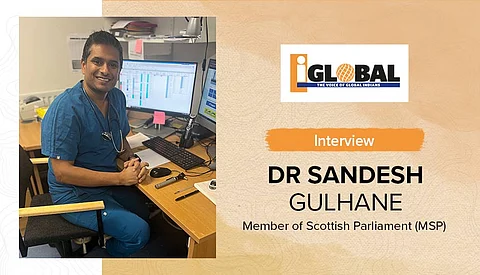

Dr Sandesh Gulhane is a Conservative member of the Scottish Parliament for the Glasgow Region since May 2021, when he became the first Hindu to be elected MSP and went on to be appointed shadow cabinet secretary for health and social care.
Raised in north London and educated at Imperial College London, he worked as an Orthopaedic Registrar in London, Birmingham, Sunderland and Glasgow before changing focus to primary care and continues to work one day per week as a National Health Service (NHS) GP. As a member of the Cross Party Group on India, he is a strong advocate of closer India-Scotland ties. This week, he tabled a question in Parliament to stress the importance of public health messaging in Hindi as the official language of India and the third most widely spoken language in the world.
Dr Gulhane, with his roots in Maharashtra and married to fellow Scottish Indian GP Dr Punam Krishan, shares insights on his decision to step into politics, balancing the demands of a busy political and medical career, and how his Indian heritage motivates him.
How do you balance two such demanding careers?
First and foremost, it’s important to understand why I entered politics. I’m not here to simply point fingers like some other politicians, but to offer solutions. Certainly, in my specialist field of healthcare, I believe that the solutions exist, they just need the political will and the right leadership to be implemented. That is the reason I have made health policy my top priority.
Working Mondays as a GP puts pressure on me to deliver across the rest of the week as an MSP. Since my maiden speech in Holyrood in May 2021, I have contributed to over 300 debates, raised over 900 questions in committee and tabled over 150 motions. Fridays is a special day for most MSPs as we usually focus on meeting constituents, in my case, across the Glasgow Region. I’m fortunate to be leading an experienced team.
As well as balancing my professional life, I have a young family and my wife is also incredibly busy as a GP and TV doctor.
MORE LIKE THIS…
What are your goals in politics?
The decision to enter politics was not one I took lightly. The Covid-19 pandemic was a pivotal moment for me. As a GP, I witnessed the strain the virus placed on our healthcare system firsthand. The hospital wards were overflowing, and it felt like we were in a constant battle against an invisible enemy.
It became clear to me that while we were battling a pandemic, we were also fighting against systemic issues that had long plagued our healthcare system. I realised that I could no longer just treat patients. I had to advocate for the changes necessary to improve the system for everyone.
And that’s why I entered politics – to ensure that we build a healthcare system that can withstand any future challenges and one that truly serves the needs of our communities.
To be clear, I firmly believe that the National Health Service is, without a doubt, one of Scotland’s most cherished institutions. It embodies our values – fairness, compassion, and the belief that healthcare should be a right for all, not a privilege for a few. But it is not perfect, far from it.
The reality is that the NHS today is under unprecedented pressure. Whether you’re a patient or a healthcare professional like me, you know that something must change.
MORE LIKE THIS…
What are some of your ideas for this much-needed NHS reform?
Earlier this year, I published a health policy paper titled ‘Modern, Efficient, Local’. This paper outlines a vision for a 21st-century NHS in Scotland, one that puts patients first by cutting through bureaucracy, embracing innovation, and bringing care back to our communities.
The core principles are:
Modernisation – Artificial Intelligence (AI) can significantly enhance radiology services by assisting in the rapid, accurate interpretation of medical images like X-rays, CT scans, and MRIs. This can reduce the workload for radiologists and improve patient outcomes by flagging urgent cases faster.
Efficiency – We need to streamline management structures and cut red tape. As a GP, I’ve experienced this first-hand. I’ve seen how doctors and nurses are bogged down by endless paperwork, time that should be better spent with patients. My plan calls for a radical rethink of how we manage the NHS.
Localism – Healthcare works best when it’s delivered locally, in communities, by people who understand the needs of the area. Centralisation often leads to a disconnect between services and patients here in rural areas.
It’s time for leadership that embraces change, real solutions, and a vision that puts patients at the centre.
MORE LIKE THIS…
What are some areas you feel Scotland and India can collaborate more on?
The Cross Party Group on India is focused on key areas of cultural exchange and FinTech. Scotland’s universities undertake world class research across data science, including health informatics, robotics, AI, quantum computing, as well as research into addressing some of the world’s most challenging medical conditions, such as dementia, brain tumours, diabetes and inflammatory diseases.
Academic collaboration and working together to commercialise research results present exciting opportunities for Scotland and India to work together.